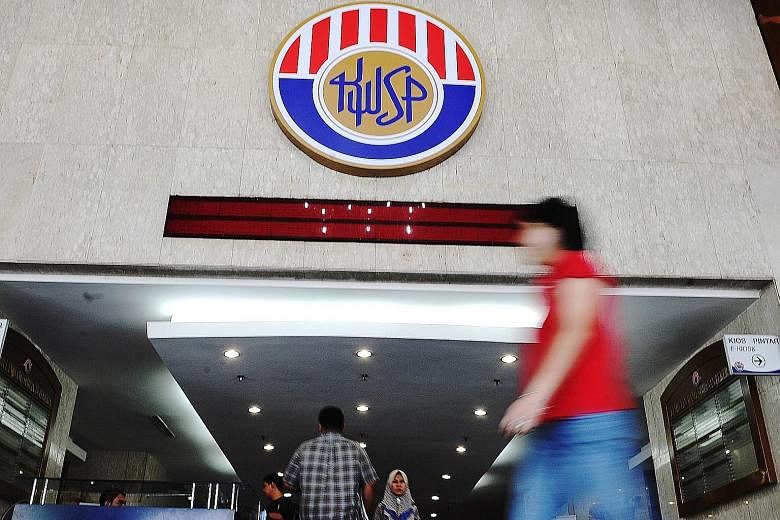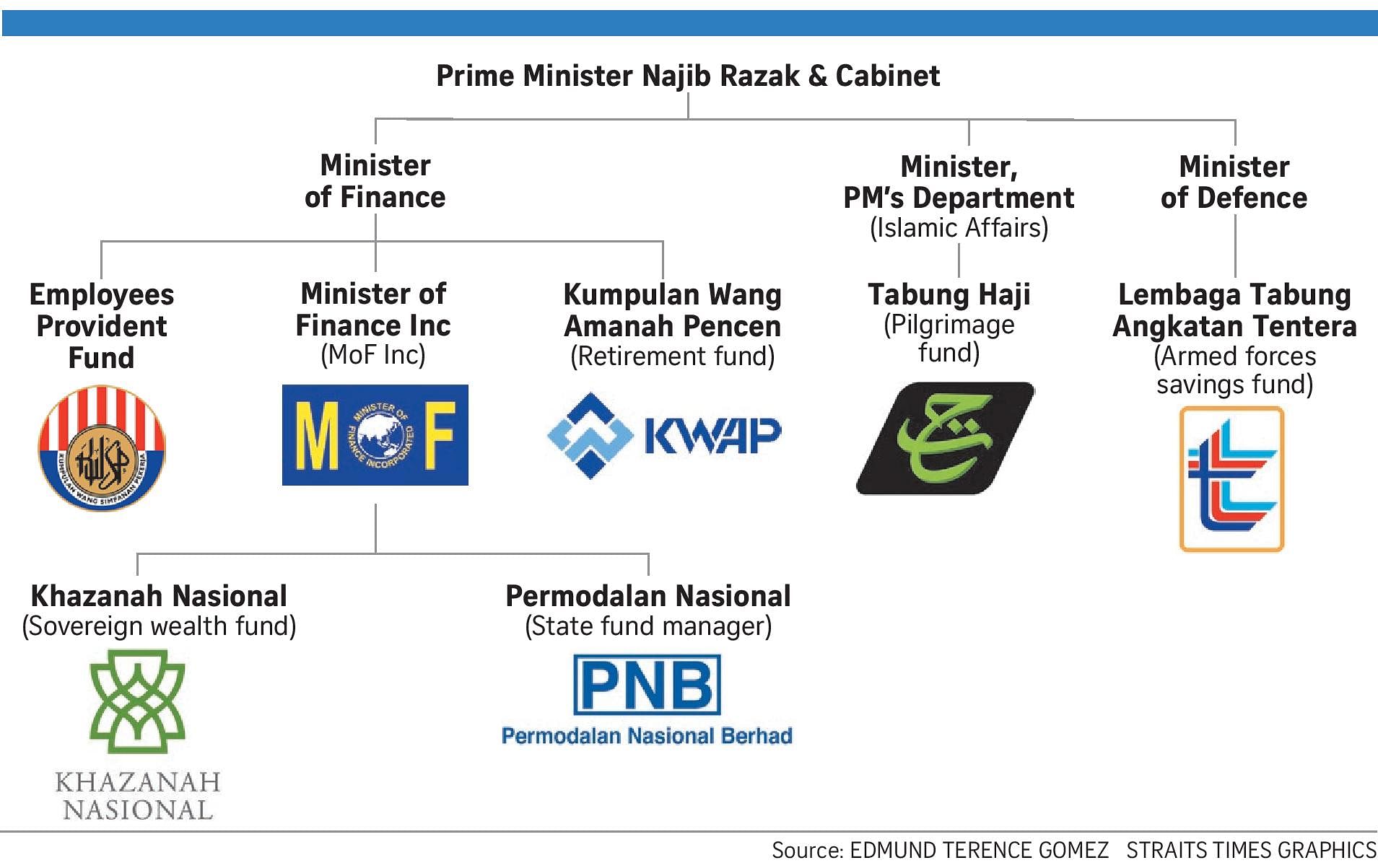The Malaysian Prime Minister's recent offer to invest up to US$24 billion (S$32.7 billion) in the United States has cast the spotlight on state funds like Khazanah Nasional and the Employees Provident Fund (EPF), and the Prime Minister's authority to direct how and where they invest.
According to a new book titled Minister Of Finance Incorporated by Universiti Malaya's Professor Edmund Terence Gomez, Datuk Seri Najib Razak not only has legitimate far-reaching powers enshrined in the management structures of these corporations, his ability to influence where their funds flow serve to entrench his position within ruling party Umno.
"Najib may have realised that he is sitting on a gold mine. One man has become extremely powerful. This is a significant shift from Umno and its members being key players in the corporate sector, to just the Prime Minister," said Prof Gomez, a leading expert on the Malaysian political economy.
In Malaysia, where the Prime Minister is also the Minister of Finance - an arrangement introduced by former prime minister Mahathir Mohamad - Mr Najib has oversight of trillions of ringgit in government assets.
The EPF Act, for example, allows the finance minister to give general direction to the board, whose members, along with those of the powerful investment panel, are decided by him. Similar provisions vesting control in the executive arm, and even explicitly in the prime minister, are littered across Malaysia's government bodies.
Mr Najib's dual role as Prime Minister and Finance Minister gives him ultimate say over seven holding firms, which Putrajaya calls "government-linked investment companies" (GLICs). These include the likes of sovereign wealth fund Khazanah Nasional and fund manager Permodalan Nasional Berhad.
The GLICs, in turn, control hundreds of government-linked companies, or GLCs - from the country's biggest bank Maybank to conglomerate Sime Darby, and regional telecom giant Axiata to the operator of the North-South Expressway, Plus Malaysia.
The assets under the seven GLICs amounted to 42 per cent of the local bourse's RM1.7 trillion market value as of 2013, according to Prof Gomez.
This is before taking into account dozens of unlisted companies, chief of which is Petronas, whose US$135 billion in assets makes it Malaysia's only Fortune 500 entry. These business interests range from banking, utilities and plantations to property development, construction and media.
ISEAS - Yusof Ishak Institute's visiting senior fellow Wan Saiful Wan Jan told The Straits Times: "This is why despite growing public discontent with his government, Najib can easily douse revolt within his party, as his control over the purse strings engenders loyalty within the ruling hierarchy."
This state of affairs, explainedProf Gomez, dates back to Mahathir-era policies, when Tun Dr Mahathir's push to create Malay corporate captains during his reign from 1981 to 2003 resulted in many of them becoming owners and directors of public-listed companies.
A large number of these corporate chieftains then were Umno leaders, including current Cabinet ministers such as Deputy Prime Minister Ahmad Zahid Hamidi and Federal Territories Minister Adnan Mansor, known individuals acting as Umno proxies, or family members of the party's top brass including Dr Mahathir's children and relatives of his then deputy Anwar Ibrahim.
Umno's collective grip on corporate Malaysia then, saidProf Gomez, allowed party warlords to direct national purse strings for political patronage. But many of these companies and corporate figures were felled by the Asian financial crisis in 1997. The resulting bailouts by the state meant that Umno's control of the corporate sector was subsumed by the government, concentrating power in the Prime Minister, who is also Umno president.
Today, only seven Umno members are directors in the GLICs, and they all serve at Mr Najib's pleasure.
S. Rajaratnam School of International Studies' senior fellow Oh Ei Sun said: "Gone are the days when one could play a senior Umno leader against others. Umno politics becomes now a race to ingratiate oneself with the president."
Indeed, despite Mr Najib promising in 2010, soon after he came to power, that government presence in business would be reduced, the opposite has happened. The GLCs have become bigger players in Malaysia's corporate sector.
According to Mr Wan Saiful, the GLCs acquired RM51.7 billion (S$16.6 billion) of assets between 2011 and 2015, while disposing RM29.5 billion. And during the same period, the government's share of the Kuala Lumpur Composite Index - which tracks the performance of the bourse's top 30 firms - increased to 47.1 per cent, from 43.7 per cent.
Seven big investment companies under Najib's control
At the apex of the structure of Malaysia's government-linked investment companies, or GLICs, sits the Minister of Finance Incorporated, or MoF Inc.
This entity has no board of directors as it represents the Finance Minister as a body corporate. Malaysia's Prime Minister Najib Razak is also the country's Finance Minister.
Among the dozens of companies MoF Inc controls is national petroleum company Petronas, which it wholly owns.
MoF Inc is just one of the seven GLICs controlled by Datuk Seri Najib.
Two of these GLICs fall directly under MoF Inc - sovereign wealth fund Khazanah Nasional (100 per cent owned) and Malaysia's largest fund manager Permodalan Nasional Berhad (PNB), in which MoF Inc owns a golden share that gives it veto power.
At the end of last year, Khazanah said its net worth totalled RM145.1 billion (S$47 billion), while PNB has RM266 billion of assets under its management.
Three other GLICs controlled by the Finance Minister are the pension funds, the largest being the RM760 billion Employees Provident Fund (EPF), which has 14 million members comprising private sector employees who contribute a portion of their income by law.
There is also Retirement Fund Inc, known by its Malay initials KWAP. This retirement fund for civil servants now operates as a state investment fund with RM125 billion to allocate. The Armed Forces Savings Fund, or LTAT, comes under the supervision of the Minister of Defence but investment decisions must still be approved by MoF Inc.
The last GLIC is Tabung Haji, the national haj pilgrims fund, which is under the Prime Minister's Department. Its task is to invest its hoard of RM65 billion to help Muslims finance their religious pilgrimages.
Collectively the seven GLICs control 35 of Bursa Malaysia's top 100 companies, according to Universiti Malaya's Edmund Terence Gomez, a leading expert on the country's political economy.
These GLICs form giant synergies in key economic sectors - banking, utilities, plantations, property development, construction and media.
MoF Inc's control of most of Malaysia's largest property and construction companies, such as conglomerate Sime Darby, UEM and SP Setia, is a crucial point, as many small companies owned by Umno members are construction outfits.
The GLICs also control five of Malaysia's top nine banks, including Maybank and CIMB, who are among the region's biggest lenders, making Mr Najib the most important figure in finance, said Professor Gomez.
Maybank, CIMB and Sime Darby are joined by national electricity provider Tenaga in Malaysia's top five listed companies.
Shannon Teoh


